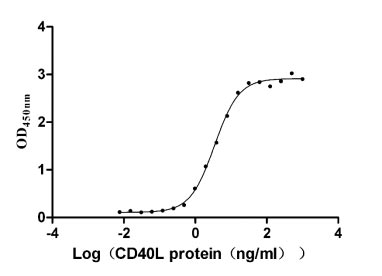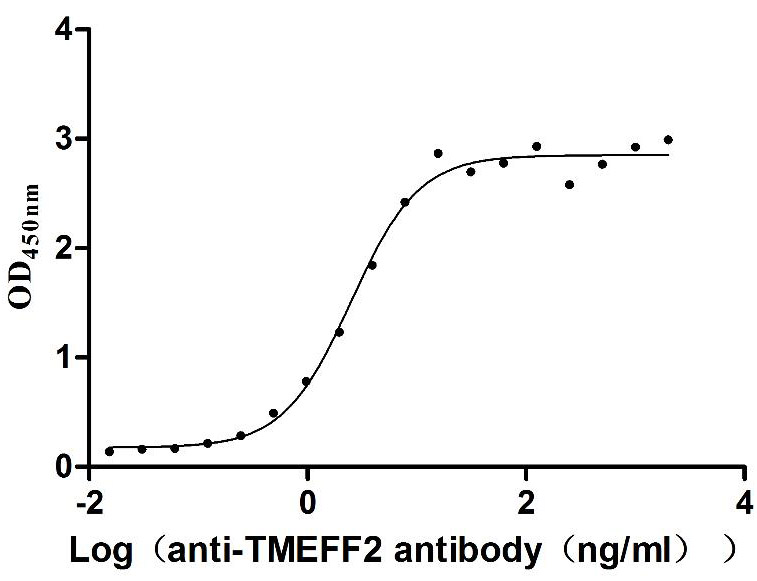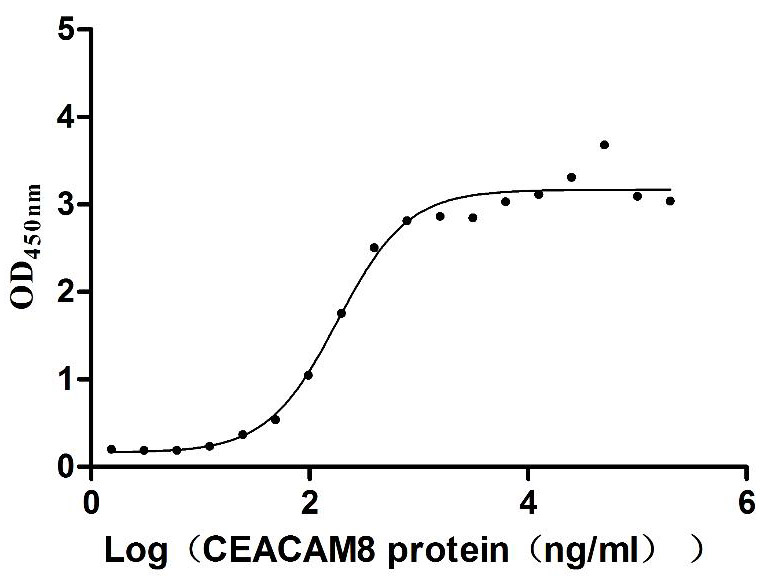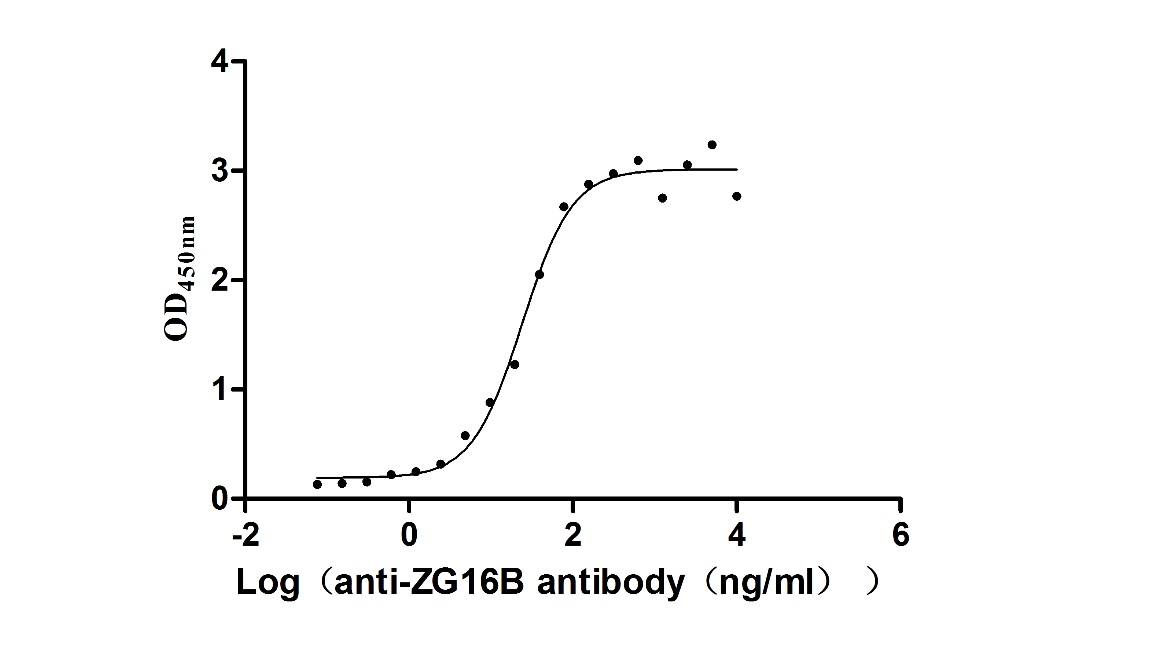Recombinant Mouse Autoimmune regulator (Aire)
-
货号:CSB-YP001502MO
-
规格:
-
来源:Yeast
-
其他:
-
货号:CSB-EP001502MO
-
规格:
-
来源:E.coli
-
其他:
-
货号:CSB-EP001502MO-B
-
规格:
-
来源:E.coli
-
共轭:Avi-tag Biotinylated
E. coli biotin ligase (BirA) is highly specific in covalently attaching biotin to the 15 amino acid AviTag peptide. This recombinant protein was biotinylated in vivo by AviTag-BirA technology, which method is BriA catalyzes amide linkage between the biotin and the specific lysine of the AviTag.
-
其他:
-
货号:CSB-BP001502MO
-
规格:
-
来源:Baculovirus
-
其他:
-
货号:CSB-MP001502MO
-
规格:
-
来源:Mammalian cell
-
其他:
产品详情
-
纯度:>85% (SDS-PAGE)
-
基因名:
-
Uniprot No.:
-
别名:AireAutoimmune regulator; Autoimmune polyendocrinopathy candidiasis ectodermal dystrophy protein homolog; APECED protein homolog
-
种属:Mus musculus (Mouse)
-
蛋白长度:full length protein
-
表达区域:1-552
-
氨基酸序列MAGGDGMLRR LLRLHRTEIA VAIDSAFPLL HALADHDVVP EDKFQETLRL KEKEGCPQAF HALLSWLLTR DSGAILDFWR ILFKDYNLER YSRLHSILDG FPKDVDLNQS RKGRKPLAGP KAAVLPPRPP TKRKALEEPR ATPPATLASK SVSSPGSHLK TKPPKKPDGN LESQHLPLGN GIQTMAASVQ RAVTVASGDV PGTRGAVEGI LIQQVFESGR SKKCIQVGGE FYTPNKFEDP SGNLKNKARS GSSLKPVVRA KGAQVTIPGR DEQKVGQQCG VPPLPSLPSE PQVNQKNEDE CAVCHDGGEL ICCDGCPRAF HLACLSPPLQ EIPSGLWRCS CCLQGRVQQN LSQPEVSRPP ELPAETPILV GLRSASEKTR GPSRELKASS DAAVTYVNLL APHPAAPLLE PSALCPLLSA GNEGRPGPAP SARCSVCGDG TEVLRCAHCA AAFHWRCHFP TAAARPGTNL RCKSCSADST PTPGTPGEAV PTSGPRPAPG LAKVGDDSAS HDPVLHRDDL ESLLNEHSFD GILQWAIQSM SRPLAETPPF SS
-
蛋白标签:Tag type will be determined during the manufacturing process.
The tag type will be determined during production process. If you have specified tag type, please tell us and we will develop the specified tag preferentially. -
产品提供形式:Lyophilized powder
Note: We will preferentially ship the format that we have in stock, however, if you have any special requirement for the format, please remark your requirement when placing the order, we will prepare according to your demand. -
复溶:We recommend that this vial be briefly centrifuged prior to opening to bring the contents to the bottom. Please reconstitute protein in deionized sterile water to a concentration of 0.1-1.0 mg/mL.We recommend to add 5-50% of glycerol (final concentration) and aliquot for long-term storage at -20℃/-80℃. Our default final concentration of glycerol is 50%. Customers could use it as reference.
-
储存条件:Store at -20°C/-80°C upon receipt, aliquoting is necessary for mutiple use. Avoid repeated freeze-thaw cycles.
-
保质期:The shelf life is related to many factors, storage state, buffer ingredients, storage temperature and the stability of the protein itself.
Generally, the shelf life of liquid form is 6 months at -20°C/-80°C. The shelf life of lyophilized form is 12 months at -20°C/-80°C. -
货期:Delivery time may differ from different purchasing way or location, please kindly consult your local distributors for specific delivery time.Note: All of our proteins are default shipped with normal blue ice packs, if you request to ship with dry ice, please communicate with us in advance and extra fees will be charged.
-
注意事项:Repeated freezing and thawing is not recommended. Store working aliquots at 4°C for up to one week.
-
Datasheet :Please contact us to get it.
靶点详情
-
功能:Transcription factor playing an essential role to promote self-tolerance in the thymus by regulating the expression of a wide array of self-antigens that have the commonality of being tissue-restricted in their expression pattern in the periphery, called tissue restricted antigens (TRA). Binds to G-doublets in an A/T-rich environment; the preferred motif is a tandem repeat of 5'-. ATTGGTTA-3' combined with a 5'-TTATTA-3' box. Binds to nucleosomes. Binds to chromatin and interacts selectively with histone H3 that is not methylated at 'Lys-4', not phosphorylated at 'Thr-3' and not methylated at 'Arg-2'. Functions as a sensor of histone H3 modifications that are important for the epigenetic regulation of gene expression. Mainly expressed by medullary thymic epithelial cells (mTECs), induces the expression of thousands of tissue-restricted proteins, which are presented on major histocompatibility complex class I (MHC-I) and MHC-II molecules to developing T-cells percolating through the thymic medulla. Also induces self-tolerance through other mechanisms such as the regulation of the mTEC differentiation program. Controls the medullary accumulation of thymic dendritic cells and the development of regulatory T-cell through the regulation of XCL1 expression. Regulates the production of CCR4 and CCR7 ligands in medullary thymic epithelial cells and alters the coordinated maturation and migration of thymocytes. In thimic B-cells, allows the presentation of licensing-dependent endogenous self-anitgen for negative selection. In secondary lymphoid organs, induces functional inactivation of CD4(+) T-cells. Expressed by a distinct bone marrow-derived population, induces self-tolerance through a mechanism that does not require regulatory T-cells and is resitant to innate inflammatory stimuli.
-
基因功能参考文献:
- The Aire fl/fl strain is a suitable model to scrutinize the cell specific function of Aire in distinct biological processes. Medullary thymic epithelial cell (mTEC)-restricted expression of autoimmune regulator (Aire) is essential for establishment of immune tolerance. Aire was also shown to be expressed in cells of hematopietic and reproductive lineages. PMID: 29193031
- Aire associates with spindle-associated proteins in mouse embryonic stem cells. Loss of function analysis revealed that Aire was important for centrosome number regulation and spindle pole integrity specifically in mouse embryonic stem cells. PMID: 28742026
- allelic variants of one AIRE SNP may differentially shape the melanoma antigen-specific T cell repertoire potentially influencing susceptibility to melanoma PMID: 27563821
- In an insulin-promoter model, lack of Aire in medullary thymic epithelial cells, but not in BM-derived APCs, impaired clonal deletion and Treg production. In an Aire-promoter Tg model, both mTECs and BM-derived APCs independently induced clonal deletion without Aire. Treg production was impaired by the lack of Aire in mTECs, but not in BM-derived APCs, suggesting an essential but not universal role for Aire in tolerance. PMID: 29101311
- the maternal microbiome influences Treg differentiation in the thymus of offspring through GPR41-mediated Aire expression PMID: 29021375
- A mutation in LYN, an inhibitory protein tyrosine kinase that is implicated in systemic autoimmunity, combines with an Aire mutation to provoke organ-specific autoimmunity. PMID: 27571405
- Aire exerts multi-faceted autoimmune control that extends to a population of innate-like T cells. PMID: 27851927
- this study shows that Aire enforces immune tolerance by ensuring that distinct autoreactive T cell specificities differentiate into the Treg cell lineage PMID: 27130899
- This finding is the first direct evidence that Aire also plays a role in controlling medullary thymic epithelial cells-thymocyte adhesion. PMID: 27505711
- findings identified two novel stages in the differentiation program of Aire(+) Medullary thymic epithelial cells. PMID: 27401343
- this study shows that Aire and some of its partners, notably those implicated in the DNA-damage response, preferentially localize to and activate long chromatin stretches that are overloaded with transcriptional regulators, known as super-enhancers PMID: 28135252
- Results indicated that AIRE influenced gene expression in germ cell 1 spermatogonial (GC1-spg) cells by acting at multiple levels, including transcription, translation, RNA processing, protein transport, protein localization, and protein degradation, thus setting the foundation in understanding the functional role of AIRE in germ cell biology. PMID: 27281783
- this study provides insight into the complex molecular mechanisms that control the medullary thymic epithelial cells-specific expression of Aire PMID: 27941786
- AIRE, which is phosphorylated on two specific residues near its N terminus, then binds to the F-box protein 3 (FBXO3) E3 ubiquitin ligase. In turn, this SCF(FBXO3) (SKP1-CUL1-F box) complex ubiquitylates AIRE, increases its binding to the positive transcription elongation factor b (P-TEFb), and potentiates its transcriptional activity. PMID: 27365398
- we found that Aire up-regulated TLR3 expression and modulated the downstream cytokine expression and nuclear factor-kappaB (NF-kappaB) of the TLR3 signaling pathway. PMID: 27916941
- Aire-expressing dendritic cells inhibited TCR signaling pathways and decreased quantity of CD4+IFN-gamma+ autoreactive T cells. Aire plays role in maintenance of peripheral immune tolerance. PMID: 26729097
- Aire may have a role in inducing Th1 and Th17 differentiation by upregulating cytokine expression in dendritic cells. PMID: 26548750
- androgen control of an intrathymic Aire-mediated tolerance mechanism contributes to gender differences in autoimmunity. PMID: 27072778
- results indicate that in females, estrogen induces epigenetic changes in the AIRE gene, leading to reduced AIRE expression under a threshold that increases female susceptibility to autoimmune diseases. PMID: 26999605
- Our results identify Aire as an important regulator of peripheral T cell homeostasis in gastrointestinal tissues. Given a suitable trigger the absence of peripheral Aire leads to dysregulated T cell proliferation and disease. PMID: 26112418
- Data indicate a highly conserved noncoding DNA element that is essential for Autoimmune regulator (Aire) gene expression. PMID: 26527800
- Aire's unique property of generating a self-tolerant T cell repertoire is functional only in medullary thymic epithelial cells. PMID: 26453754
- Molecular characterization of the functional domains of Aire has revealed multiple binding partners that assist Aire's function in altering gene transcription and chromatin remodeling. PMID: 26579596
- Aire expression in thymic epithelial cells was decreased in germ-free mice without commensal bacteria. PMID: 25157574
- Aire's collaboration with the bromodomain-containing protein, Brd4, uncovered correspondence between those genes induced by Aire and those inhibited by a small-molecule bromodomain blocker. PMID: 26216992
- Aire increased the diversity of the thymic epithelial cell transcriptome and seemed to target genes expressed in a minority of cells, and increased expression of its target genes. PMID: 26237550
- Data indicate that keratin 17 (k17) regulates autoimmune regulator Aire to promote skin tumorigenesis. PMID: 26168014
- Data show that sirtuin 1 (Sirt-1) mediated deacetylation of Aire protein was required for the transcriptional-transactivational potential of Aire. PMID: 26006015
- AIRE-dependent versus AIRE-independent tissue-restricted antigens project nonredundant representations of peripheral tissues in the thymus. PMID: 26034170
- expressed in thymic but not peripheral B cells PMID: 26070482
- subfertility in Aire(-/-) mice is dependent on a functional adaptive immune system thus confirming its autoimmune aetiology. PMID: 25689230
- Aire promotes the perinatal generation of a distinct compartment of Foxp3(+)CD4(+) regulatory T (Treg) cells, which stably persists in adult mice. PMID: 25791085
- The results reveal a cooperation between medullary thymic epithelial cells and CD8alpha+ dendritic cells for presentation of Aire-induced self-antigens to developing thymocytes. PMID: 25220213
- Results indicate the roles of Aire in the differentiation program of medullary thymic epithelial cells (AEL-mTECs). PMID: 24516201
- Aire-containing complexes include 7SK RNA, the latter interaction disrupted by HNRNPL knockdown, suggesting that HNRNPL may partake in delivering inactive P-TEFb to Aire PMID: 24434558
- We demonstrated the importance of Aire's interaction with the ATF7ip-MBD1 protein complex in maintaining central tolerance PMID: 24464130
- There is an age-related association between Aire and regulatory T cells (Tregs) in the susceptibility to experimental autoimmune encephalomyelitis. PMID: 23849800
- These findings add to the understanding of how specific DC subtypes regulate the early responses during T cell-dependent antibody responses within the spleen and further define the role of AIRE in the periphery as regulator of self-antigen expression and lymphocyte migration. PMID: 23265639
- Aire can facilitate early chondrocyte differentiation by expression of Bmp2 through altering the histone modification status of the promoter region of Bmp2. PMID: 23850677
- These findings reveal a mutual interdependence of miRNA and Aire in the regulation of promiscuous gene expression in purified mouse and human thymic epithelial cells PMID: 23589212
- Aire can play a role as a controller of transcription of miRNAs located within genomic regions encompassing ORF and/or mRNA genes. PMID: 22883565
- Aire deficiency promotes TRP-1-specific immune rejection of melanoma. PMID: 23370329
- Blockade of B7-1/B7-2 in NOD.AireGW/+ mice results in fulminant, early-onset autoimmune peripheral neuropathy. PMID: 23487421
- transcriptional activity determines expression profile of peripheral tissue antigen genes in medullary thymic epithelial cells PMID: 22564670
- [review] The autoimmune regulator Aire is a critical transcription factor for generating central tolerance in the thymus and is highly conserved between human and mouse AIRE proteins. PMID: 23456700
- Data indicate that Aire requires its PHD2 domain to effectively impose immunological tolerance. PMID: 23319629
- These results indicate a unique DNA methylation profile that is independent of Aire in medullary thymic epithelial cells. PMID: 23116172
- These findings suggest that the capacity of Aire to regulate expression of a huge array of tissue-restricted antigens relies solely on an unconventional transcriptional mechanism, without intermediary transcription factors. PMID: 23041971
- Aire-mediated expression of peripheral tissue antigens drives the thymic development of a subset of organ-specific T(regs), which are likely coopted by tumors developing within the associated organ. PMID: 23471412
- Aire promotes the self-renewal of embryonic stem cells through the activation of Lin28 and the inhibition of the let-7 microRNA family. PMID: 22540148
显示更多
收起更多
-
亚细胞定位:Nucleus. Cytoplasm.
-
组织特异性:Highly expressed in a few cells in the medulla of the thymus (medullary epithelial cells) (at protein level). Expressed in thymic but no peripheral B-cells. In secondary lymphoid organs, expressed in a discrete population of bone marrow-derived toleregeni
-
数据库链接:
KEGG: mmu:11634
STRING: 10090.ENSMUSP00000114904
UniGene: Mm.35300
Most popular with customers
-
Recombinant Human Tumor necrosis factor receptor superfamily member 5 (CD40), partial (Active)
Express system: Mammalian cell
Species: Homo sapiens (Human)
-
Recombinant Human Leukemia inhibitory factor (LIF) (Active)
Express system: Mammalian cell
Species: Homo sapiens (Human)
-
Recombinant Rat Intestinal-type alkaline phosphatase 1 (Alpi) (Active)
Express system: Mammalian cell
Species: Rattus norvegicus (Rat)
-
Recombinant Mouse Tyrosine-protein kinase Mer (Mertk), partial (Active)
Express system: Mammalian cell
Species: Mus musculus (Mouse)
-
Recombinant Human Claudin-6 (CLDN6)-VLPs (Active)
Express system: Mammalian cell
Species: Homo sapiens (Human)
-
Recombinant Human Tomoregulin-2 (TMEFF2), partial (Active)
Express system: Mammalian cell
Species: Homo sapiens (Human)
-
Recombinant Human Carcinoembryonic antigen-related cell adhesion molecule 6 (CEACAM6) (Active)
Express system: Mammalian cell
Species: Homo sapiens (Human)
-
Recombinant Macaca fascicularis zymogen granule protein 16 homolog B (ZG16B) (Active)
Express system: Mammalian cell
Species: Macaca fascicularis (Crab-eating macaque) (Cynomolgus monkey)






-AC1.jpg)













